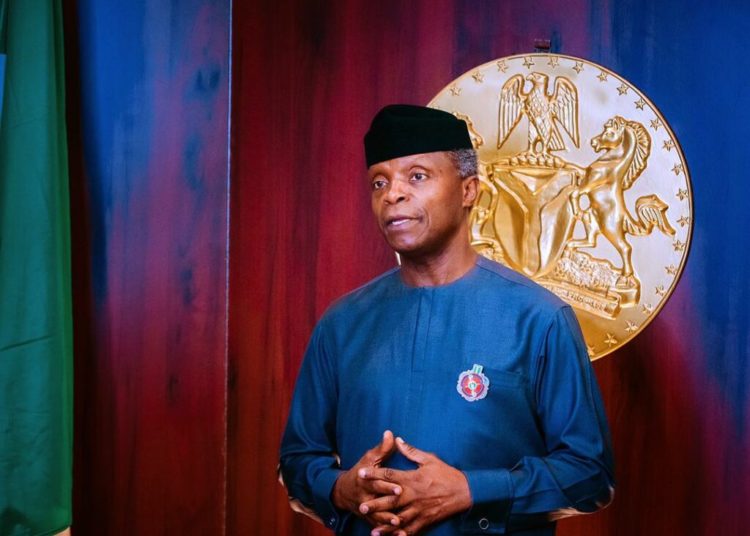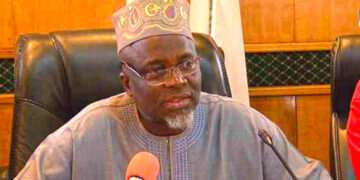Africa’s developmental aspirations can be actualised by deepening cooperation and collaboration with the rest of the world, according to Vice President Yemi Osinbajo (SAN). But the imperative of Africa’s economic sovereignty also exists as there are areas where public and private sector leaders must continue to strive for it.
Osinbajo stated this yesterday at the opening panel of the ongoing Africa CEO Forum holding in the Ivorian city of Abidjan. The panel was themed: “Economic Sovereignty: From Ambition to Action.”
In a statement issued by his spokesman, Laolu Akande, the vice president who had arrived in Ivory Coast last night was welcomed at the Felix Houphouët-Boigny International Airport by the Prime Minister of Cote d’Ivoire, Mr Patrick Achi.
Other speakers at the opening panel were, President Nana Akufo-Addo of Ghana; the managing director of the International Finance Corporation, Mr Makhtar Diop; the Governor of the Kenyan Central Bank, Dr Patrick Njoroge; the CEO of Telcar Cocoa, Kate Kanyi Tometi-Fotso and CEO of Instadeep, Karim Beguir.
Emphasising the need for collaboration between Africa and the rest of the world, Prof. Osinbajo said “I think that we have to be a bit more careful with the concept of economic sovereignty because we really need to collaborate more and with the way that development is going, we need to watch some of these things.
“For instance, if we look at the way that technology is going which is key for us in Nigeria, particularly issues of taxation of tech companies and all of that, it is evident that this is difficult and it is a major expression of sovereign power – the power to tax.”
Continuing, the Vice President said “the way that the world and technology are structured today, there is no way that you can use the same basis – personal and territorial basis for taxation. These are multinational enterprises that spread across countries and continents.”
Osinbajo noted that “we have got to cooperate with the world and the international tax system to ensure that we are able to derive maximum benefit. We have got to take a seat at the table and ensure that all of the various initiatives on international taxation favour us in Africa.”
According to him, “while we are looking inwards, we have to be very careful to look outwards as well because a lot of money is obviously used by tech companies across the world and a lot of our countries are value creators for these companies.
“There is a great need for us to look inwards and at the same time keep our eyes on the ball because we need to recognize that the world has gone beyond brick and mortar.
The world is now more about intellectual capital. We have to think of how we can work with the world to achieve maximum benefit for our intellectual capacity.”
In another chat with organisers of the forum, the CEO of BUA Group, Alhaji Abdulsamad Rabiu, spoke about the concept of economic sovereignty, urging Africa to look inwards as a way of fast-tracking development on the continent.
He cited leveraging opportunities provided by the Africa Continental Free Trade Agreement (AfCFTA) and improving infrastructure as some of the key areas that leaders in the continent must focus on.
Earlier at the opening ceremony of the forum, President Alassane Ouattara of Cote d’Ivoire commended the initiative of the organisers to bring together public and private sector leaders across the continent and beyond to discuss and develop new paths aimed at boosting the transformation of economies across Africa.
He noted that though the COVID-19 pandemic may have negatively impacted growth projections in the continent, the vision of the forum and similar efforts are geared towards “building new partnerships between the public and private sector, especially providing opportunities for young Africans with particular focus on green economy.”
On his part, the President and Founder of the Africa CEO Forum, Amir Ben Yahmed, commended leaders across the continent for their efforts despite the disruptions in the global economy occasioned by the COVID-19 pandemic and the Russia-Ukraine conflict.
He noted that economic sovereignty, green economy and industrial transformation, among others are new paths to Africa’s prosperity, adding the projected impact of the AfCFTA on economies across the continent was premised on a viable and productive economy.
The cice president is also billed to hold bilateral meetings with the managing director of the International Finance Corporation (IFC), Mr Makhtar Diop, and the United Nations SG’s Special Advocate on Inclusive Finance for Development, her Majesty, Queen Maxima of Netherlands.





